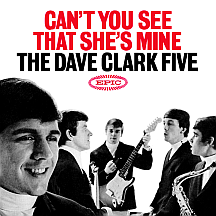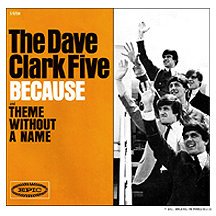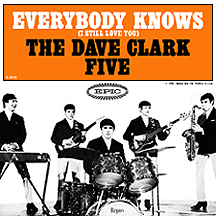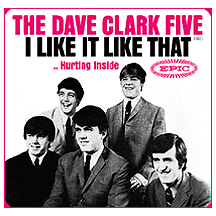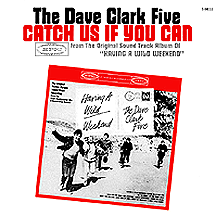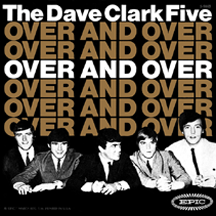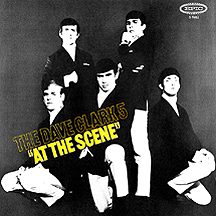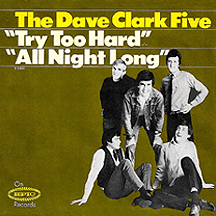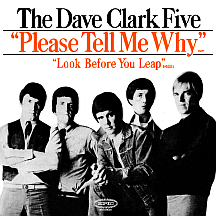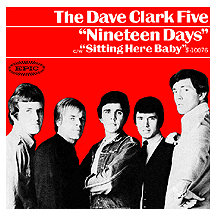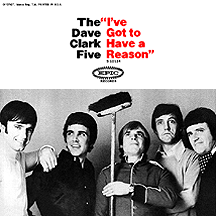THE DAVE CLARK FIVE
To those of us in America, they were "The Beatles Part Two," the second group component of the British Invasion. The Dave Clark Five suddenly appeared within a few weeks of the Fab Four in early 1964, and for a little while there was a period of indecision between Beatlemaniacs and DC5ers. While in England, Gerry and the Pacemakers (who beat the Beatles to number one), Billy J. Kramer and the Dakotas, Freddie and the Dreamers, The Hollies, The Searchers and others had slipped in before the DC5 the previous year, as of March '64 only the two British bands were hitting in the States (along with female duo The Caravelles and solo singers Cliff Richard and Dusty Springfield). Others joined them throughout the year, but it was Mike Smith, Lenny Davidson, Rick Huxley, Denny Payton and Dave Clark who made many of us feel, if only for a minute, or a day, or a week, that maybe John, Paul, George and Ringo weren't the best from across the pond.
Of course any notions of that sort quickly subsided, but the Dave Clark Five still holds that special distinction of getting in ahead of the stampede. They were uniquely configured as British bands go; leader Dave was the group's drummer, Lenny and Rick played guitar and bass, respectively, Mike was the keyboard player and lead singer, and Denny's sax playing gave the group an Americanesque R&B edge rare among U.K. acts regardless of how blues-based they were. Rhythm and blues, in fact, was their first love and, with American rock and roll, was where their heads were at. From the start, Dave was the ringleader, the mastermind; this after following his dream of acting around 1958, when he was 15. He got on track musically shortly after that (as a sideline to playing for a youth soccer team), forming The Dave Clark Quintet, and over the next two or three years lineup changes eventually locked in the permanent five. About the time Payton joined as the final member, late 1961 or early '62, the guys were all between 18 and 21 years of age and the name for fame was set, DC Quintet becoming Dave Clark Five.
Seldom was the case with rock groups that the drummer called all the shots. Finding a strong singer with attitude was tricky, but Dave knew he had his man when Smith came along in 1960. The guys were from various parts of London, Middlesex and Kent but were based in the northern London suburb of Tottenham. The DC5 wanted to sound different from the groups inspired by skiffle in the '50s or the Merseybeat bands of Liverpool, intentionally going for a cross between R&B (Chicago and pre-Motown Detroit) and the stompin', sax blowin' bands of the Pacific Northwest (along the lines of Paul Revere and the Raiders, who began their own ascent thousands of miles away at about the same time). Their style became known as "The Tottenham Sound," a bit off the mainstream, perhaps, but all the better for Clark and company to refine the sound as their own. Still, getting a label deal was difficult, even after some three or four years' practice as of 1963. For a time the group recorded demos before the opportunity to make records under their own name presented itself.
During contract negotiations with EMI, Clark's insistence on creative control somehow didn't result in his being shown the door, and when he asked for a much higher royalty rate than the current standard, they gave it to him. Whether a case of excellent timing or just a colossal bluff, it worked in favor of the DC5 but more specifically Dave himself, as the contract also designated that he alone would retain rights to all of the band's recordings after the initial period of license. The other four did share in the long-term profits, though, as many of their songs were written as a group effort and writing credits appeared under several different combinations of Clark, Smith, Davidson, Huxley and/or Payton.
Nearly all of the band's recordings fall under two categories: original compositions or rock and R&B standards done up DC5-style. They debuted with a cover of a Motown smash, Berry Gordy, Jr.'s "Do You Love Me" (top ten in the U.S. for The Contours in late '62), making a minor showing on the U.K charts in fall 1963 but going against another version by Brian Poole and the Tremeloes that got the jump on theirs and went all the way to number one. Clark held no ill will towards the Tremeloes, focusing instead on his own good fortune; he has said that when the song first appeared on the charts it was one of his biggest thrills. The group's second single, on the other hand, wasn't overshadowed at all. "Glad All Over," a Clark-Smith original released at the end of the year, knocked the Beatles' "I Want to Hold Your Hand" out of the number one slot in mid-January '64; as it turns out each song was a milestone for its respective act when the British Invasion of America (soon to be coined as such by CBS news anchor Walter Cronkite) started just a week or two later.
"Glad All Over" appeared on Epic Records in the States, making a less-than-grand entrance on the charts in mid-February (by this time the Beatles were on top with "I Wanna Hold" and were charting with five additional singles, having debuted one each week since mid-January). The record began a steady climb and continued working its way up after the group's appearance on The Ed Sullivan Show March 8 (two weeks after the Fab Four's third ratings-busting guest shot in a row). The Dave Clark Five returned as Ed's guests on March 15 and within a couple of weeks the single, while not explosive, made it into the U.S. top ten. The Searchers popped up at about that time as the third Invasion band, gaining exposure quietly in comparison to the DC5 while both were seemingly crushed under the unprecedented explosion of the Beatles. But those two Sullivan appearances had made an impact, however delayed.
The foot-stomping "Bits and Pieces," already a number two hit in England, came out at the start of April and shot up the charts so quickly that it joined "Glad All Over" in the top ten by month's end (yet three Beatles hits still ranked higher). The achievement would have been more notable had their Liverpudlian rivals not been there first, but without them to pave the way it probably wouldn't have happened at all. Congress Records released a track from a pre-EMI session, "I Knew it All the Time" (a Piccadilly release from 1962), and the Jubilee and Rust labels each had a single of earlier material on the market, while Epic waited less than a month to promote "Do You Love Me," the first U.K. breakthrough, a much bigger hit in the U.S. "Can't You See That She's Mine," another top ten hit, followed in June, and the tight release schedule resulted in four simultaneous chart singles. Fan magazines were playing up a "Beatles vs. Dave Clark Five" battle (however lopsided) and the band seemed to be everywhere, taking advantage of their sweet secondary status as dozens of other British acts began lining up behind them.
All of the hits to this point were uptempo rockers, energetically so, highlighted by Mike Smith's strong, growling vocals and Dave's heavy-handed drumming. Epic execs felt this was the way they should continue (keep in mind that label heads are often shortsighted). Clark had followed an earlier suggestion by the A&R department at EMI, declining to release his ballad "Because" as a single, despite his better judgment that an occasional ballad breaks the uptempo barrage and offers variety; besides, he loved the song and didn't want to repeat what he felt had been a mistake. Epic refused to release the song stateside at first, claiming it could ruin the group's career, but Dave insisted (after all, he had the final say, right?) and his judgment was correct. The record hit number three in September, the biggest DC5 hit of '64. The midtempo "Everybody Knows (I Still Love You)" (cowritten with Davidson) followed, then the label released its preferred type of record, "Any Way You Want It," the hardest-reverberating single yet. All told, the group had seven top 20 hits on the Billboard charts in 1964, four of which went top ten (the tally from Cash Box Magazine totaled six top tens), and there was no slowing of momentum in 1965.
The group felt at home in the States and spent a lot of time here, blanketing the country with concert appearances surpassing any other band in '64 and '65, playing to capacity crowds almost everywhere they showed up. They traveled in their own private plane with a bold "DC5" logo emblazoned on the side, a first for a rock group. The world, in fact, was their stage, and they performed in just about every country that didn't have bans against rock concerts. There was an appearance in the late '64 MGM film Get Yourself a College Girl starring Mary Ann Mobley, another in a long line of inane teen comedies notable only for the music acts contained within (in this case The Animals, Stan Getz and Astrud Gilberto, Jimmy Smith and The Standells). "Thinking of You Baby," another hot uptempo number, was one of two songs performed in the film, a hit single in England but merely a track on the film's soundtrack album in the U.S.
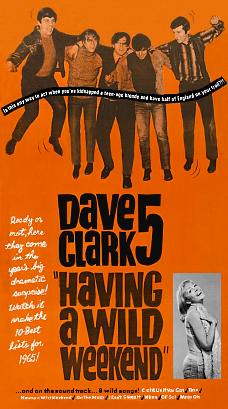
Clark was not pleased with the movie or the band's part in it, particularly in the wake of the Beatles' A Hard Day's Night, an artistic and commercial triumph. Fortunately, Jack Warner felt the DC5 would be ideal for a similar project and approached Dave about it. Demanding creative control (Clark's M.O. by this time) and getting it, he chose "unknown documentary director" John Boorman (later a major player with Deliverance, Hope and Glory and other top-notch films). Catch Us if You Can (released in the U.S. by Warner Bros. as Having a Wild Weekend due to a copyright conflict), costarring Barbara Ferris, was surprisingly good; the film had a downbeat style that worked for them (as opposed to being a straight Hard Day's imitation) and the guys came off well onscreen. Reviews were good yet Clark, for personal reasons, declined all future offers to make films.
The hits kept coming: "Come Home," a Clark-Smith ballad, was followed by Chuck Berry's "Reelin' and Rockin'" and Chris Kenner's "I Like it Like That" (top ten for the DC5 as it had been for Chris), benchmark rock/rhythm songs that paved the way for more. Having a Wild Weekend's original title song "Catch Us if You Can" went top ten in September '65, then a remake of the 1958 Bobby Day hit "Over and Over," in the final week of December, gave the Dave Clark Five that elusive number one U.S. hit they'd been seeking. "At the Scene" (as with "Catch Us," written by Dave and Lenny), "Try Too Hard" and "Please Tell Me Why" (both by Dave and Mike), all trademark DC5 rockers, were big in the early months of 1966. A pair of Clark-Payton tunes, ballad "Satisfied With You" and its polar opposite, screamer "Nineteen Days," were lesser hits and left some wondering at the close of 1966 if the group was running out of steam.
Re-energizing a pre-Motown Berry Gordy song, "You Got What it Takes" (a smash for Marv Johnson in 1960), Dave and company landed back in the top ten in the spring of 1967. A few other songs charted in America, the last top 40 hit being "You Must Have Been a Beautiful Baby" (the 1938 Harry Warren-Johnny Mercer song best known by Bing Crosby and also a hit for Bobby Darin in 1961). They began accepting current compositions by outside writers including "Everybody Knows" (by Les Reed and Barry Mason), an oddity considering they'd already had an "Everybody Knows" hit in 1964. The '67 song, with a Lenny Davidson lead vocal, was the group's most successful U.K. single since "Bits and Pieces." The U.S. hits stopped cold in '68, but looking back on their concentrated hitmaking period of 1964 through 1967, they were more successful in America than in their native United Kingdom.
The late '60s was a great period for the DC5 in England. Their first and only TV special, Hold On: It's the Dave Clark Five, directed by Clark, appeared on LWT (London Weekend Television, part of the ITV network) in August 1968 with guests Richard Chamberlain and Lulu. There were several more major hits, most notably "Red Balloon" that same year, "Good Old Rock 'n Roll" in '69 (a cover of the Cat Mother and the All Night News Boys summertime U.S. hit produced by Jimi Hendrix) and "Everybody Get Together" in 1970.
At one point in '69 they decided the best days were behind them and they would go out while still on top, agreeing to call it quits after one more year. There were two U.K. top tens in the interim, but that didn't deter them. Lenny, Rick and Denny departed, while Dave and Mike formed a new group, Dave Clark and Friends, to satisfy contractual obligations with EMI (a cover of Tommy James' U.S. hit "Draggin' the Line" was the first of several singles under this name). Three years later, at the end of the act's original ten year deal, they scattered for good and never reunited, at least not to record or tour. Today we can enjoy the music of The Dave Clark Five, which remains preserved as a prominent part of a specific time period: 1963 to 1970.
NOTABLE SINGLES:
- Do You Love Me - 1963
- Glad All Over - 1964
- Bits and Pieces - 1964
- I Knew it All the Time - 1964
- Can't You See That She's Mine - 1964
- Because - 1964
- Everybody Knows (I Still Love You) - 1964
- Thinking of You Baby - 1964
- Any Way You Want It - 1964
- Come Home - 1965
- Reelin' and Rockin' /
I'm Thinking - 1965 - I Like it Like That - 1965
- Catch Us if You Can - 1965
- Over and Over - 1965
- At the Scene - 1966
- Try Too Hard /
All Night Long - 1966 - Please Tell Me Why /
Look Before You Leap - 1966 - Satisfied With You - 1966
- Nineteen Days - 1966
- I've Got to Have a Reason - 1967
- You Got What it Takes - 1967
- You Must Have Been a Beautiful Baby - 1967
- A Little Bit Now - 1967
- Red and Blue - 1967
- Everybody Knows - 1967
- No One Can Break a Heart Like You - 1968
- Red Balloon - 1968
- Live in the Sky - 1968
- Put a Little Love in Your Heart - 1969
- Good Old Rock 'n Roll - 1969
- Everybody Get Together - 1970
- Here Comes Summer - 1970
- More Good Old Rock 'n Roll - 1970
- Draggin' the Line - 1971
by Dave Clark and Friends


